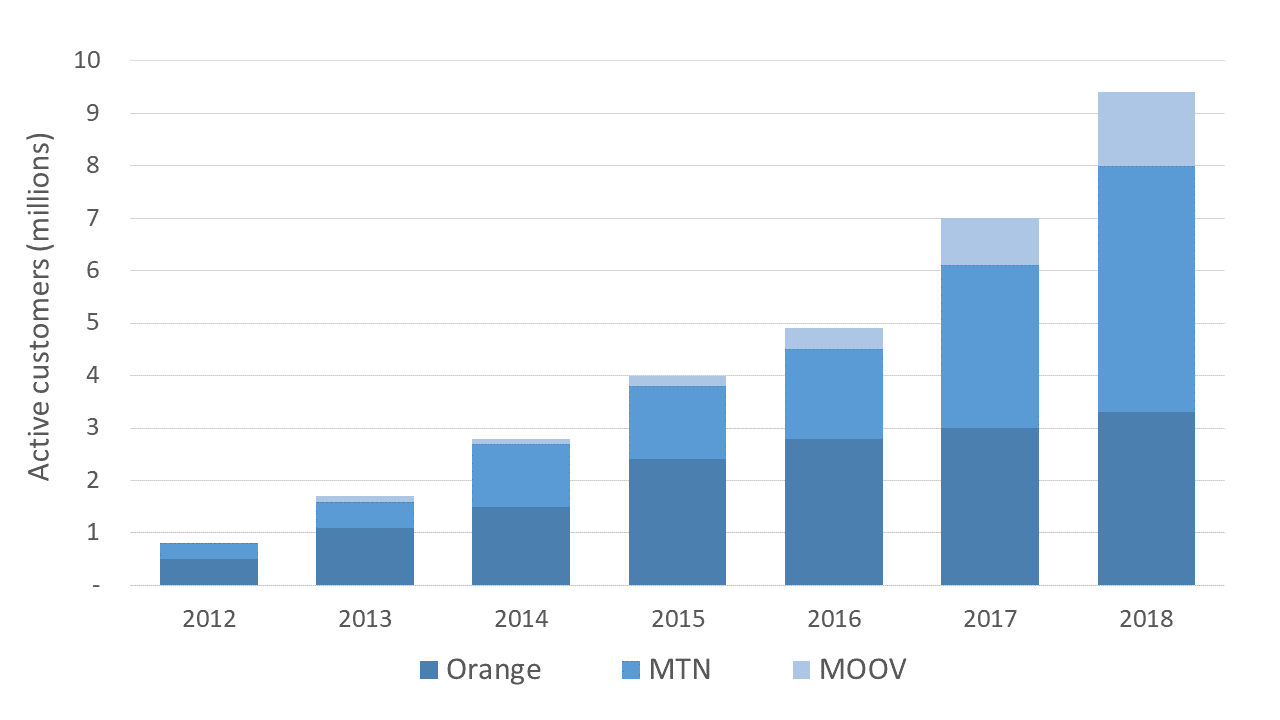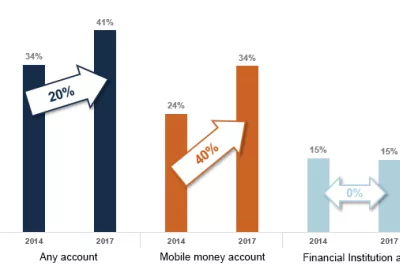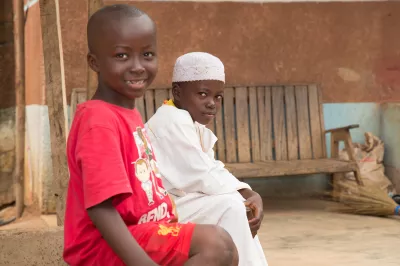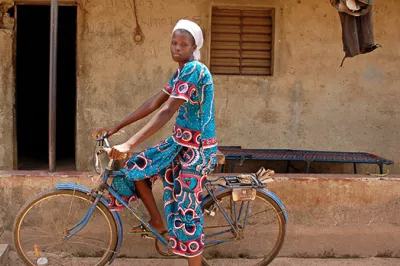Beyond Regulations: What’s Driving Mobile Money in Côte d’Ivoire?
When the Central Bank of West African States (BCEAO) issued regulations in 2015 that encouraged nonbanks to issue e-money, it set the stage for a digital transformation in Côte d’Ivoire. Between 2014 and 2017, mobile money almost single-handedly drove a 20 percent increase in financial account ownership across the country. As we explored in an earlier blog post, the story of mobile money in Côte d’Ivoire illustrates why an enabling regulatory approach is one of the most important factors — if not the most important — in building the foundations of an inclusive digital financial services (DFS) ecosystem. However, as CGAP’s research in Ghana and Tanzania bears out, other factors are important, too. These other factors, as explained in this post, have also been at play in Côte d’Ivoire.
Executive commitment and investment
It generally takes DFS providers years to generate customer awareness, build an agent network and achieve profitability, so senior executive buy-in and investment is crucial. The first DFS provider to build a mobile money operation in Côte d’Ivoire was Orange, which took a risk by moving ahead in an unclear regulatory environment. Orange’s sustained commitment to building infrastructure and customer awareness allowed the company to achieve a dominant position in the market early while setting the stage for the entire industry’s growth. However, competition started to heat up following the new 2015 regulations and the creation by Orange and MTN of e-money issuer subsidiaries. MTN restructured itself to be more competitive and formed a mobile money unit. From this point on, MTN began to gain larger market shares, and various mobile money providers raced to bring mobile money across the country. By 2018, the number of active mobile money agents (i.e., those who had transacted over the past 90 days) had grown to more than 93,000 from just 16,000 four years earlier.
Competition on the rise
CGAP’s research has found that competition may not be essential during the early phases of market development. In fact, a dominant provider with significant capital may be more helpful because it is in a better position to achieve network effects. As the market matures, however, competition becomes increasingly important to drive customer value. In Côte d’Ivoire, MTN has challenged Orange’s initial dominance and has taken the lead in terms of active customers (90 days), even if Orange continues to lead in terms of volume and value of transactions. Moov has doubled down on mobile money in the face of declining margins in the voice and data business and is giving away airtime and data bonuses to promote mobile money use. Increasingly, banks are launching their own DFS products (e.g., YUP for Société Générale and Xpress account for Ecobank). Although banks’ agent networks are tiny, their ability to develop a diverse set of financial products might give them an advantage over MNOs in the long run. It will be interesting to see how the market dynamics change as Orange Bank, a digital bank owned by Orange and NSIA, enters the scene. Orange Bank will offer retail banking, microcredit and insurance services.
Active Mobile Money Customers in Côte d’Ivoire (90 Days)

Interconnected services
As in other markets in Sub-Saharan Africa, interoperability between DFS providers has not been a factor in building the basic DFS ecosystem in Côte d’Ivoire. However, interoperability is likely to play a more important role as providers seek growth opportunities. A survey of Tanzanian customers found that interoperability reduced the time and cost of payments and enhanced network effects. Côte d’Ivoire is expected to be the first country where Orange and MTN will launch Mowali, a joint venture to enable interoperable payments across Africa. Additionally, Côte d’Ivoire shares its currency and central bank with seven West African countries, so there is significant interest in regional interoperability. BCEAO is implementing a regional interoperability project to make all types of financial accounts interoperable across all eight countries by mid-2020. This could lead to a number of new use cases in Côte d’Ivoire and greater use by customers.
Compelling use cases
No matter the level of provider investment or enabling regulation, people will not use mobile money unless there are compelling use cases. As in other markets in the region, payments are the dominant use case in Côte d’Ivoire. Person-to-person (P2P) money transfers have been the single biggest use case driving mobile money use. However, other types of payments have played a larger role than we’ve seen in other markets. Côte d’Ivoire is recognized for its digitization of virtually all secondary school fee payments in 2014. That same year, 99 percent of the country’s 1.5 million secondary school students paid their school fees digitally — 94 percent via mobile money transactions and 6 percent via online payments.
Cross-border transfers are also more prevalent in Côte d’Ivoire than in markets in other parts of Africa. As the most advanced economy in the region, Côte d’Ivoire attracts many migrants from neighboring countries who send remittances home. Since 2013, MNOs have developed bilateral arrangements with other MNOs (or internally across parts of the business in different markets) to allow cross-border transfers. By value, cross-border transfers are almost equal to P2P transfers and exceed bill payments.
Types of E-Money Transactions in Côte d’Ivoire, 2017

Payments — bills, cross-border money transfers and P2P — have all contributed to the rise of mobile money in Côte d’Ivoire. As in other markets, providers are experimenting with digital credit and merchant payments to drive growth. In 2018, MTN and Bridge Bank launched MoMoKash, a savings and credit product. The product attracted 1.9 million customers in a year, but the interest rate cap (15 percent for banks and 24 percent for microfinance institutions) makes it challenging to develop a profitable business model and may prevent the launch of new initiatives.
Crisis and instability — a sixth enabling factor for DFS?
During the first half of 2011, Côte d’Ivoire faced a major political and military crisis that resulted in bank closures that lasted weeks. During this period, some mobile money agents stayed open. People started flocking to mobile money accounts as a way to keep their money safe or send it to friends and family. Some industry leaders credit this crisis as being the single biggest impetus to drive mobile money growth in Côte d’Ivoire. Interestingly, some people say the same thing about Kenya, where widespread violence following a contested general election less than a year after M-PESA’s launch led to a sharp uptick in mobile money use, as ATMs were empty and bank branches closed. In times of crisis, the flexible, ubiquitous nature of mobile money becomes clear and people are more willing to try something new.
Looking ahead
With 34 percent of its adult population now owning a mobile money account, Côte d’Ivoire has achieved critical mass and is on a strong upward trajectory. The introduction of interoperability, Orange’s bank and other new players should add momentum to mobile money. Yet providers still see challenges ahead.
According to Luc Assi, the head of mobile money at Moov: “Despite huge progress in mobile money adoption, mentalities have not yet totally changed. There are still as many balance inquiries as other transactions. Merchant payment adoption is hampered by the fact that suppliers will not accept mobile money payments. The lack of shared infrastructure is also a brake to adoption.”
Providers are particularly concerned about a new taxation regime that entered into force this year, which some believe unfairly disadvantages MNOs that have launched nonbank e-money issuers. Government and industry leaders will need to continue to work together to overcome these challenges and ensure that the hard-won gains of the past few years propel the DFS industry to the next level.




Add new comment